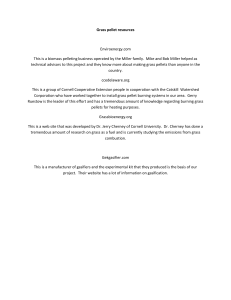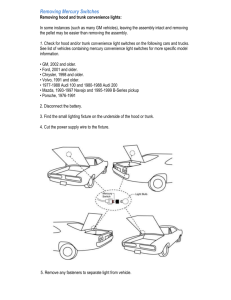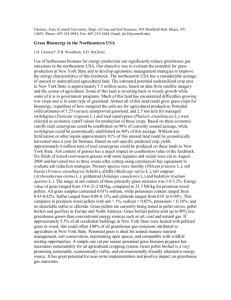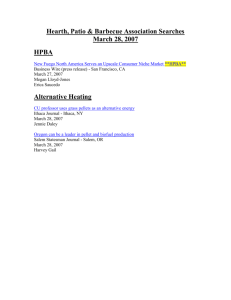Hearth, Patio & Barbecue Association Searches
advertisement
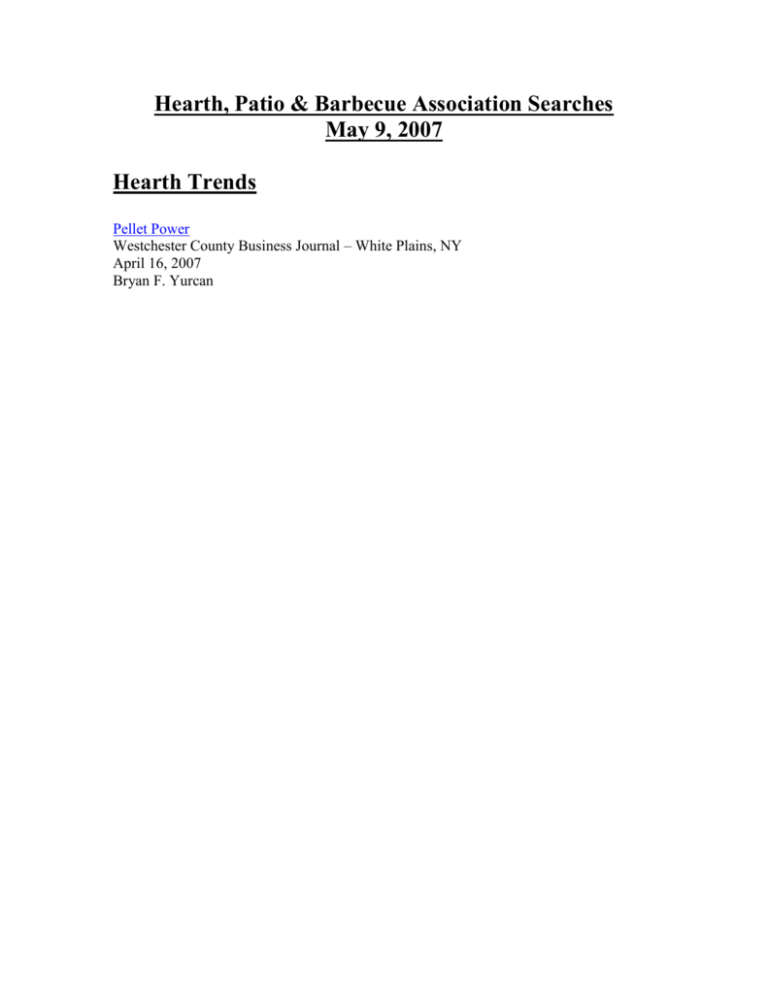
Hearth, Patio & Barbecue Association Searches May 9, 2007 Hearth Trends Pellet Power Westchester County Business Journal – White Plains, NY April 16, 2007 Bryan F. Yurcan Pellet Power Westchester County Business Journal – White Plains, NY April 16, 2007 Bryan F. Yurcan In his younger days, Jim Badami worked with his father at the family's reuse business," selling used packaging to the farmers in Ulster County to store their produce. The two would refurbish the wirebound wooden boxes that grocery stores used to store and package produce. Then, from the mid-1970s into the 1990s, wax cardboard boxes became the popular choice for packing produce. When Badami needed a way to get rid or the excess boxes economically, he piled them in the back yard and burned them, since waxy cardboard cannot be recycled. That's when he got an idea. "I sent a sample to the Department or Energy and they said 'if you can market this stuff you've got the supplemental energy product of the future,"' he said. Now Badami, along with his business partner, White Plains attorney Dan Seidel, are hoping to bring the energy product of the future into the present. Seidel has already invested more than $70,000 in Badami's pelletizing operation. Seidel met Badami at a bio-fuel conference and found they both shared the same passion for alternative and renewable energy sources. Seidel is a member of the Westchester County Soil and Water Conservation District board. "I was very enthused with the process," Seidel said. "I figured I would start investing, since there's no government funding for it." Since he first got the idea in the early 1990s, Badami spent several years researching and buying the equipment to convert the boxes into pellets that can be used in pellet-burning stoves. He admits the process much harder before the invention of the Internet. Once he obtained the right equipment and perfected the process, Badami heated his family's home in New Paltz for nearly two years using the cardboard pellets, much to the chagrin of his oil supplier. "He said 'Jim, you're tank is still full, what's wrong?"' after noticing Badami had not needed an oil supply for many months. "I told him I was heating the house with pellet fuel." OUT OF THE ASHES However, Badami's oil independence was short-lived, as the town issued numerous fines after a neighbor complained about the noise and aesthetics of his equipment. The pelletizing process requires several large pieces of equipment, in order to heat, cool, and die-cast the pellets. Badami maintains he was guilty of no wrongdoing, and the fines drove him out of New Paltz. "I was never told who my accuser was or what my crime was," he said. Asked about the fines, the town of New Paltz code enforcement office would not comment, but suggested that a Freedom of Law request be submitted. After that, Badami moved to Middletown and met Seidel shortly after and told him about the cardboard pelletizing process. "So, I resurrected the damn thing," Seidel said with a laugh. The two men plan to sell the pellet fuel to local farmers and industry. Seidel said there are plans to expand to a site in Westchester, in Buchanan, in a 250,000 square-foot facility off of Route 9A. "It's brand new technology," Seidel said. "Pellet stove fuel is low cost, it's the thing of the future for home heating and industrial heating." Badami also said he has been in contact with a group of potential investors from Canada, who may be interested in building further pellet mills, although Badami said he was not at liberty to divulge any further information. GROWING THE FUEL Joseph Heller resource conservation and development coordinator with the National Resource Conservation Service, a division of the U.S. Department of Agriculture, mentioned Badami's operation as an example of a creative way of using alternative energy. Heller said in many ways, agriculture is at the forefront of the movement to develop and use alternative energies in order to lessen the country's dependence on foreign oil. He mentioned grass bio-energy as one such option. "Grass pellets can significantly reduce greenhouse gases and heating costs," he said. Like, with Badami's wax cardboard and other types of pellets, such as straw pellets, a special pellet stove is needed to burn it in. Some pellet stoves that are able to burn wood pellets advertise that they can also burn grass pellets, Heller said. But the problem is grass pellets are not produced on a mass scale in this country. A person interested in using grass pellets for fuel would have to buy a pellet stove that could accommodate grass pellets, and then have to locate an intrepid entrepreneur in their area, like Badami, who has the ability to manufacture them. And although grass pellets are not on the market yet, I Heller says, "We have made large advances to getting us to that point." He said with the benefits of pellet fuel gaining traction in the public consciousness more public and private funding will become available. President George Bush mentioned the use of switchgrass pellets as a viable form of energy in his State, of the Union address. As pellet-produced energy grows in popularity, Hudson Valley farmers could reap the economic benefits by becoming wholesale or retail sellers of grass, straw, and other types of fuel pellets. According to the Cornell University College of Agriculture and life. Science, the northeastern United States as the highest potential for growing and farming grass for biofuel purposes. LOOM TO DELIVER Another problem the NRCS and local soil and water conservation districts are tackling is how to transport the pellets to consumers once they begin to be produced. "We would need to meet consumer needs in an efficient way," he said. One potential local option would be to use, the Hudson River as a distribution system, he said. "Nothing is too small," he said. "We're just scratching the surface with ideas." Badami said he has had no problems with the city of Middletown regarding his operation, and he feels there is already a built-in customer base for when the pelletizing operation is up and running. "I have assured local growers that we have been successful producing pellets, which makes it a viable project," he said. rhere's no place this won't work. It creates job, and it does not produce any pollution. Wax cardboard is a petroleum product and we throw thousands of pounds out daily across the country." Seidel, too, believes in the project. That's why I invested the money," he said. "This really has the ability to bring down fuel costs, and Jimmy's process is fantastic," he said. But regardless of any potential profits, Badami insists his main goal is contributing toward Americas energy independence. "We can lessen our dependence on foreign oil if we take the time to focus properly and move ahead one step at a time," he said.
